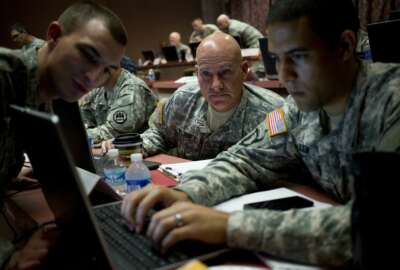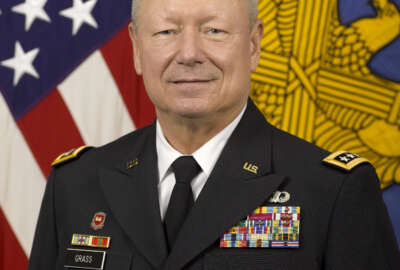
Army Cyber flies two pilots to bring in cyber recruits
Army Cyber Command is starting two pilots aimed at bringing in more tech savvy soldiers.
Army Cyber Command is using all the legal resources it can to recruit and keep soldiers and civilians with cyber skills, including two newly established pilot programs.
The command is establishing a test program that directly commissions officers from the private sector with cyber talent. In addition, a second pilot was created on Jan. 30 called the Civilian Cyberspace Effects Career Program. That program will follow similar IT and intelligence programs in giving advice to advance civilian careers.
The direct commission program would give cyber experts an officer ranking without going through military prerequisites.
“Congress is giving us until 2020, where each service secretary will submit a report on their findings as to implementation of their pilot,” Director of the Army Cyber Directorate Brig. Gen. Patricia Frost during a Feb. 8 roundtable at the Pentagon. “This parallels how medical corps, the lawyers and the chaplains did this.”
Army Cyber Command Deputy General for Operations Brig. Gen. J.P. McGee said the pilot will start off small and it will be scaled based on how the pilot pans out.
“I think it recognizes that there are some unique contributions that the civilian workforce in this sector has to offer. It’s a pilot so we are going to try and figure it out. I think we still need to flesh out what it is. I think there is an indication that there is some appetite among industry to be able to do this and I would point to the Defense Digital Service and that element,” McGee said.
The Defense Digital Service is an agency created by the Defense Department that hires private sector employees with cyber skills.
The Army’s pilots are part of a wider need for cyber professionals in the service and in the military writ large.
The Army is required to provide some of DoD’s 133 cyber protection force teams by 2018. Right now it has 30 teams at full operating capacity and 11 are at initial operative capacity. The National Guard and Army Reserve have 21.
Frost said the Army will finish its cyber protection team requirement early at the end of this year.
Still, the need for cyber soldiers is felt all across the military.
Earlier this week, Air National Guard Director Lt. Gen. L. Scott Rice called the need for cyber warriors “insatiable.”
In recent years DoD and other government agencies have had problems hiring young, tech savvy employees. In 2013, only 7 percent of government employees were under 30. That’s compared to about 19 percent in 1973, an Office of Personnel Management study stated.
“We need to do things to uniquely create and be able to manage cyber soldiers so we can remain effective. There are all sorts of compelling reasons why the cyber workforce, if you include military and civilian, needs to be treated in some ways differently than the rest. … Some of these are just bending processes,” McGee said. “There are a lot of existing elements we can utilize to be adaptive to be able to do that.”
McGee said the Army is standing up a talent management cell in Army Cyber Command to work the policy, procedures and legal issues to develop a system that is responsive to military needs.
Copyright © 2025 Federal News Network. All rights reserved. This website is not intended for users located within the European Economic Area.
Scott Maucione is a defense reporter for Federal News Network and reports on human capital, workforce and the Defense Department at-large.
Follow @smaucioneWFED




